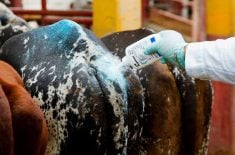Winnipeg — A member of the RCMP’s cattle investigations unit in Alberta says the high price of cattle has drawn unwanted attention.
Cpl. Dave Heaslip has noticed a slight influx of cattle-reported thefts this year, and he believes it is due to the record high prices being offered for heifers and steers.
“There is a marked increase, which could indicate more cattle are being stolen or that more thefts are being reported, he said.”
Fortunately, Heaslip and his counterparts are making convictions.
In late May, 2014, an Alberta court sentenced a man to two years in jail for a million dollar cattle theft. In that instance, the man, posed as a spot buyer, financed some cattle, rented trucks, and then took them to feedlots in the U.S. for finishing.
Read Also

Mixed year for hail claims across Prairies: CCHA
The 2025 crop year was an average year for hail across the Canadian Prairies, with overall claim numbers down slightly compared to last year, reported the Canadian Crop Hail Association (CCHA).
At first, everything looked like it was in order, but the cheque never got back to the Canadian financer, Heaslip said.
There is no firm number reported for missing cattle in Alberta, but Heaslip says it’s sizable. One problem police run into arises when owners file missing animal reports, but later find them and don’t tell the RCMP.
As to stealing cattle, Heaslip says it isn’t as hard as it sounds.
“You could fit 60 heifers, 400 to 500 pounds in a straight-haul trailer. As soon as you’ve got the first few loaded the rest will follow them up there,” he said.
Some thieves only take one animal at a time as part of a longer-term business plan. Heaslip came recently across a husband and wife team near Mayerthore, Alta., who would drive around to go “grocery shopping.”
He said if they could get close to a younger animal they would lasso it and then put it in their trailer. They’d then drive to an isolated location and if the animal was branded they would butcher it on the spot and process the meat. If it wasn’t, they would take it home and give it to a mother-cow to raise. Heaslip said the couple was trying to slowly build up their herd.
He said all cattle should be branded and have Canadian Cattle Identification Agency ear tags.
He added that a lot of ranchers operate with the trust of a handshake and that is what thieves count on.
“That’s what we run up against is the old western trust. That goes from Manitoba west. The trust of a handshake.”














